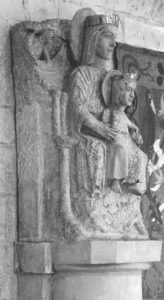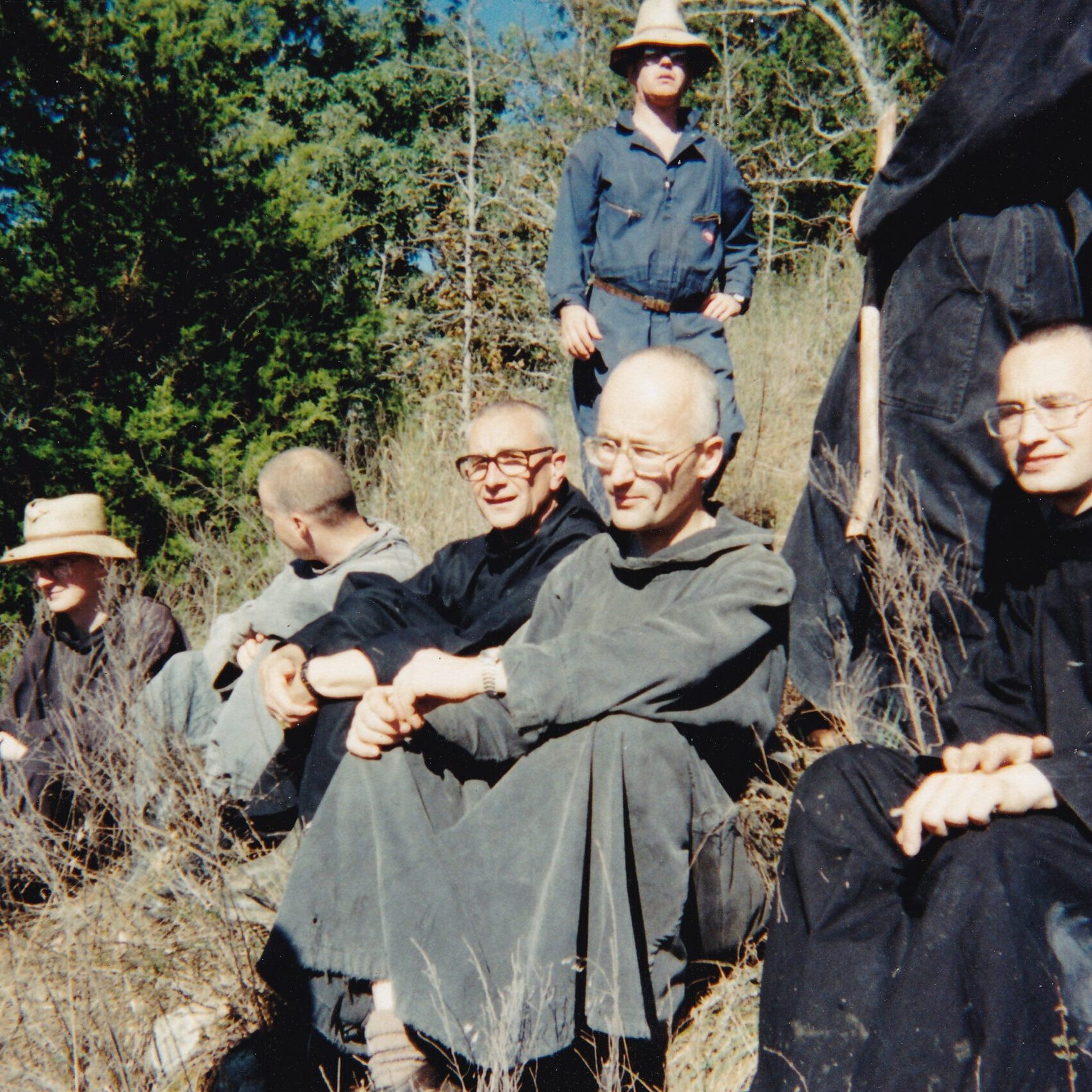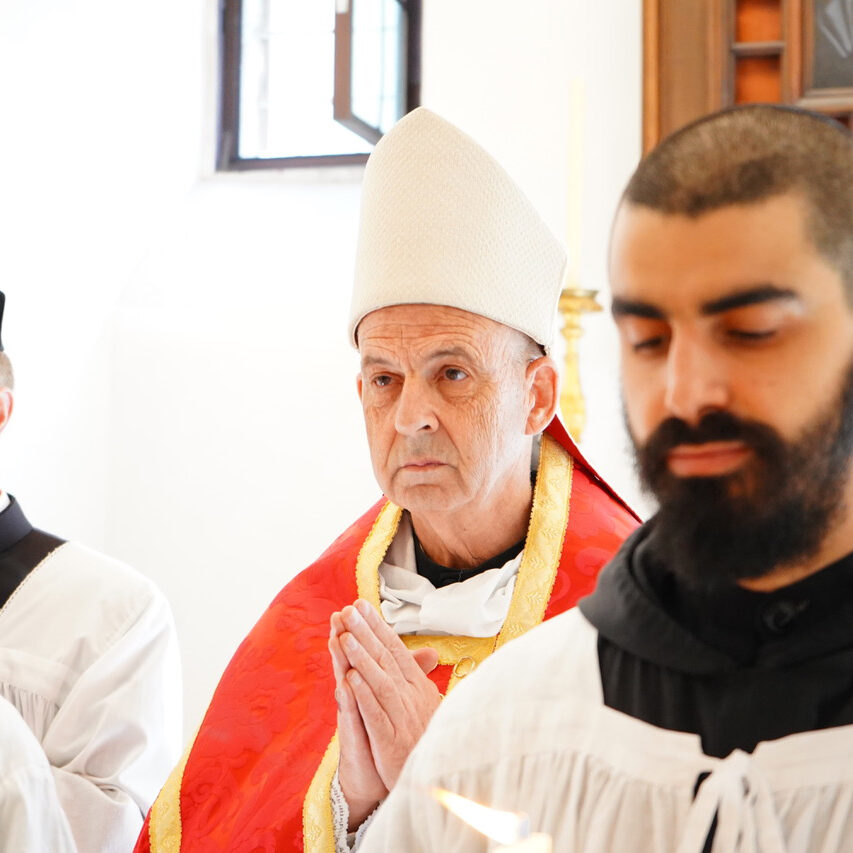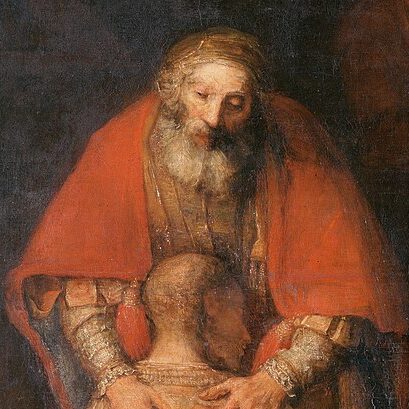Dear Friend of Clear Creek Abbey,
 It has been said that there is a vocation for places just as there is a vocation for people, for souls. Fontgombault Abbey is just one of those places. During its history of over nine centuries, countless are the graces that have radiated from this hallowed ground, where so many generations of monks have come and gone. The story of Our Lady of a Happy Death is one of the most beautiful of these favors from Heaven.
It has been said that there is a vocation for places just as there is a vocation for people, for souls. Fontgombault Abbey is just one of those places. During its history of over nine centuries, countless are the graces that have radiated from this hallowed ground, where so many generations of monks have come and gone. The story of Our Lady of a Happy Death is one of the most beautiful of these favors from Heaven.
Long had the statue of Our Lady, seated “in majesty” as they refer to this type of artistic representation (Mary seated on a throne, arrayed like a queen of France, with the Child Jesus on her lap), watched over the Abbey from her vantage point, high above the northern portal of the abbatial church, overlooking the gardens just inside the stone wall and the little cemetery of the monks. No one knows exactly when this particular limestone statue was set there, but she had probably been in place since the twelfth century, when the Faith was still young in France and the Abbey was overflowing with young men come to consecrate their lives to God. God only knows how many monks going about their laborious chores in the garden she contemplated, how many Brothers, having come to the end of their earthly pilgrimage, she saw entrusted to their final resting place beneath a simple wooden cross planted in the ground.
In the year of Our Lord 1791, harder times had come to France and to the Church. Countless were the Christians sacrificed on the altar of Revolution, especially in Paris, where the tireless work of the guillotine filled the street gutters with rivers of human blood. Trouble had come to the countryside as well. Already at the beginning of the century, the greed of the secular landlord of Fontgombault had chased away all but five monks. By this time, at the end of the century, not a single monk was left to sing the Divine praises. The mayor of the village of Fontgombault had begun to sell the very stones of the Abbey walls (July 2, 1791). But the work of destruction was not yet complete.
It was about this time that an impious hand sought to destroy the statue of Mary above the northern door of the church. He positioned a ladder and climbed up in order to carry out the practice, quite common with the revolutionaries, of breaking off the head and members of a piece of art that offended him and the new ideas of those who had no more need of God and His Saints. As he swung his hammer, however, he suddenly lost his balance and fell off the ladder, hurting himself mortally when he hit the ground far below.
As he lay dying, the poor man regretted in an instant the evil deed he had done and begged God, through the intercession of the Virgin Mother of God whom he had so gravely offended, to forgive him. Such was his change of heart, his conversion at the moment of death, that the witnesses recognized in the event a special grace from heaven. From that moment on the statue has been known as Our Lady of a Happy Death.
Less than a century later a new monastic community of Trappists took possession of Fontgombault Abbey and began to restore the buildings. By this time the miraculous statue had been moved inside the church and cement heads were made to replace those of the Virgin and of her Child destroyed by the revolutionaries. By the time the monks were ready to re-dedicate the church in 1899, however, the anticlerical government of France at that time forbade the ceremony.
It was not until the middle of the twentieth century that the church at Fontgombault was finally re-dedicated, after monks of the Solesmes Congregation, of the Order of Saint Benedict, had completed the restoration of the Abbey. During the jubilee year of 1950 Dom Edward Roux, the first Abbot of the Solesmes foundation, commissioned the well-known sculptor, Claude Gruer, to fashion two new heads of stone, following closely the canons of Romanesque art.
In 1991, Fontgombault Abbey celebrated her 900th birthday. In order to mark this historic occasion, Our Lady of a Good Death was solemnly crowned by the Archbishop of Czestochowa, His Excellency Monsignor Nowak (September 7, 1991). Our Lady and her Son no longer sit atop the northern portal exposed to the elements, but rather have a place of honor in the nave of the abbatial church, where, not only do the monks come to make their devotions day and night, but a great number of pilgrims from every part of the world arrive at all times of the year — particularly for the Abbey’s patronal feast on August 15th — to light a candle and implore much needed graces, especially that of a peaceful and happy death. As in the twelfth century, Our Lady of a Happy Death continues even now to show them the key that unlocks the enigmas and dark passages of our human existence: the baby Son she holds on her lap, the Prince of life.
May this story of Our Lady of a Happy Death, Notre-Dame du Bien Mourir, help us all to better understand the words we so often recite, “Holy Mary, Mother of God, pray for us sinners now and at the hour of our death.” Amen.
br. Philip Anderson, prior
Dear Friend of Clear Creek Abbey,
 It has been said that there is a vocation for places just as there is a vocation for people, for souls. Fontgombault Abbey is just one of those places. During its history of over nine centuries, countless are the graces that have radiated from this hallowed ground, where so many generations of monks have come and gone. The story of Our Lady of a Happy Death is one of the most beautiful of these favors from Heaven.
It has been said that there is a vocation for places just as there is a vocation for people, for souls. Fontgombault Abbey is just one of those places. During its history of over nine centuries, countless are the graces that have radiated from this hallowed ground, where so many generations of monks have come and gone. The story of Our Lady of a Happy Death is one of the most beautiful of these favors from Heaven.
Long had the statue of Our Lady, seated “in majesty” as they refer to this type of artistic representation (Mary seated on a throne, arrayed like a queen of France, with the Child Jesus on her lap), watched over the Abbey from her vantage point, high above the northern portal of the abbatial church, overlooking the gardens just inside the stone wall and the little cemetery of the monks. No one knows exactly when this particular limestone statue was set there, but she had probably been in place since the twelfth century, when the Faith was still young in France and the Abbey was overflowing with young men come to consecrate their lives to God. God only knows how many monks going about their laborious chores in the garden she contemplated, how many Brothers, having come to the end of their earthly pilgrimage, she saw entrusted to their final resting place beneath a simple wooden cross planted in the ground.
In the year of Our Lord 1791, harder times had come to France and to the Church. Countless were the Christians sacrificed on the altar of Revolution, especially in Paris, where the tireless work of the guillotine filled the street gutters with rivers of human blood. Trouble had come to the countryside as well. Already at the beginning of the century, the greed of the secular landlord of Fontgombault had chased away all but five monks. By this time, at the end of the century, not a single monk was left to sing the Divine praises. The mayor of the village of Fontgombault had begun to sell the very stones of the Abbey walls (July 2, 1791). But the work of destruction was not yet complete.
It was about this time that an impious hand sought to destroy the statue of Mary above the northern door of the church. He positioned a ladder and climbed up in order to carry out the practice, quite common with the revolutionaries, of breaking off the head and members of a piece of art that offended him and the new ideas of those who had no more need of God and His Saints. As he swung his hammer, however, he suddenly lost his balance and fell off the ladder, hurting himself mortally when he hit the ground far below.
As he lay dying, the poor man regretted in an instant the evil deed he had done and begged God, through the intercession of the Virgin Mother of God whom he had so gravely offended, to forgive him. Such was his change of heart, his conversion at the moment of death, that the witnesses recognized in the event a special grace from heaven. From that moment on the statue has been known as Our Lady of a Happy Death.
Less than a century later a new monastic community of Trappists took possession of Fontgombault Abbey and began to restore the buildings. By this time the miraculous statue had been moved inside the church and cement heads were made to replace those of the Virgin and of her Child destroyed by the revolutionaries. By the time the monks were ready to re-dedicate the church in 1899, however, the anticlerical government of France at that time forbade the ceremony.
It was not until the middle of the twentieth century that the church at Fontgombault was finally re-dedicated, after monks of the Solesmes Congregation, of the Order of Saint Benedict, had completed the restoration of the Abbey. During the jubilee year of 1950 Dom Edward Roux, the first Abbot of the Solesmes foundation, commissioned the well-known sculptor, Claude Gruer, to fashion two new heads of stone, following closely the canons of Romanesque art.
In 1991, Fontgombault Abbey celebrated her 900th birthday. In order to mark this historic occasion, Our Lady of a Good Death was solemnly crowned by the Archbishop of Czestochowa, His Excellency Monsignor Nowak (September 7, 1991). Our Lady and her Son no longer sit atop the northern portal exposed to the elements, but rather have a place of honor in the nave of the abbatial church, where, not only do the monks come to make their devotions day and night, but a great number of pilgrims from every part of the world arrive at all times of the year — particularly for the Abbey’s patronal feast on August 15th — to light a candle and implore much needed graces, especially that of a peaceful and happy death. As in the twelfth century, Our Lady of a Happy Death continues even now to show them the key that unlocks the enigmas and dark passages of our human existence: the baby Son she holds on her lap, the Prince of life.
May this story of Our Lady of a Happy Death, Notre-Dame du Bien Mourir, help us all to better understand the words we so often recite, “Holy Mary, Mother of God, pray for us sinners now and at the hour of our death.” Amen.
br. Philip Anderson, prior






